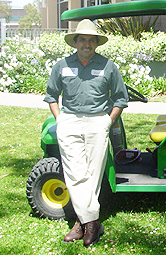Have you noticed the relatively recent botanic changes to the Ellison Courtyard grounds around Ellison Hall? The delightful transition from a dense mat of overgrown grape ivy to a colorful assortment of clivias, calla lilies, pride of Madeira, day lilies, datura, split leaf philodendrons, and agaves is due to the efforts of Emmer Ruano, the UCSB groundskeeper for our neck of the woods. And Emmer’s grounds are flourishing, thanks in part to coffee grounds.
Emmer is in charge of Zone 2 of the UCSB campus which encompasses an area stretching from Phelps and Buchanan to Campbell and North Halls. About 10 years ago, Emmer noticed that the Coffee Cart by the Buchanan Store threw out a lot of coffee grounds at the end of each day, and Emmer, being a knowledgeable gardener, knew that coffee grounds are good for plants. Unable to use all of the grounds for his own home composting efforts, Emmer began using them to amend the soil around his Zone 2 plantings—and vive la difference!
Coffee grounds have a carbon-to-nitrogen ratio of 20:1, roughly equivalent to that of grass clippings. About 2 percent nitrogen by volume, used coffee grounds provide a safe substitute for nitrogen-rich manure in the compost pile. While freshly ground coffee is acidic, most of the acidity is removed in the brewing process, and any minor residual acidity is buffered with age or by composting. Coffee grounds also contain trace amounts of potassium, phosphorous, calcium and magnesium, all of which are required for healthy plant growth and healthy soils.
The word about using coffee grounds as mulch and soil amendment spread, and the practice has now been integrated into the UCSB Sustainability Program. Matt O’Carroll, a Waste Management & Recycling Intern with UCSB Facilities Management who is working on the new project, explains that: “The University Center here at UCSB purchases over 30,000 lbs. of coffee a year. With waste diversion from our landfills becoming a practice of utmost importance, the UCEN began composting coffee grounds from its dining facilities and satellite food services early this year. The practice has recently formalized into a coffee grounds composting program, “UCSB Grounds to Grounds,” thanks to suggestions made from Facilities Management Grounds Crew staff member Robert Pinto and collaboration between staff from the UCEN and Facilities Management.
The program will continue the direct application of UCEN coffee grounds to landscape areas on-campus, where they serve as beneficial, low-cost organic soil amendment. The change will facilitate the collection and transportation of the coffee grounds, as well as significantly reduce UCEN’s expenditures on biodegradable bags–a switch that will make the practice more sustainable overall. Dining facilities participating in the program include the Arbor, Coral Tree Cafe, Courtyard Cafe, and the coffee carts at Buchanan Hall, the Student Resource Building, and Humanities and Social Sciences. So, be on the lookout for the buckets at those locations, and let the smell of coffee around campus be a sign that the University is actively composting!”
Editor’s note: for more about Emmer and UCSB groundskeeping, see the July 31, 2008 article “Emmer Ruano, Groundsman Extraordinaire.”





